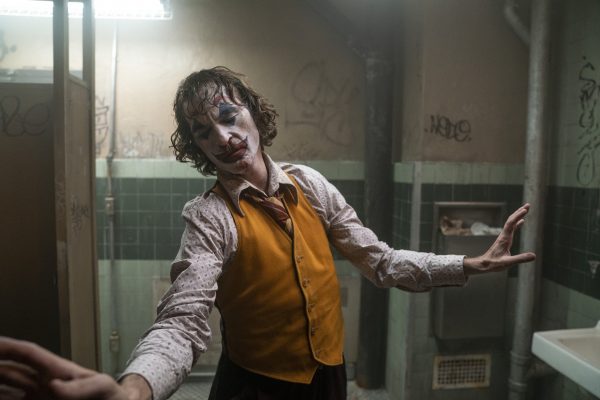Movie Review: “Joker”
Since the iconic performance by Heath Ledger hit the big screens with “The Dark Knight” back in 2008, audiences everywhere have been captivated with the Joker. While the iconic role has had its fair share of performances and interpretations from cartoon appearances in “Batman: The Animated Series” to cartoonish performances in “Suicide Squad,” Todd Phillip’s “Joker” takes the character under a microscope and explores the sociopathic criminal in an all-new light by giving the character of a million backstories an origin story. And with the help of a jaw-dropping performance by Joaquin Phoenix, the movie absolutely nails it.
“Joker” tells a grim tale for the iconic DC supervillain. Working as a clown in a crime-ridden city with massive levels of economic inequality, the audience sees so much more than the protagonist’s descent to evil. The movie lets the audience feel not only feel Joker’s pain but the fear he can cause with a single laugh.
Unlike traditional horror films, Joker does not rely on jump scares and gruesome monsters to terrify the audience, and instead lets the character’s actions speak for themselves. Phoenix’s laugh sounds as if he is in legitimate pain, and the sudden brutal acts of violence leave audience members feeling horrified and unsafe. You can feel the instability in it. Not only do you not trust a single thing Joker does, but you can’t trust a single thing you see either. It’s extremely hard to tell at times what is real and what is a sick delusion the protagonist makes up in his head.

This image released by Warner Bros. Pictures shows Joaquin Phoenix in a scene from the film, “Joker.” (Niko Tavernise/Warner Bros. Pictures via AP)
Separating it even further from the comic book movie genre, “Joker” is not an action-packed film. Instead, it relies on deep character analysis and psyche exploration to drive the plot. Since Batman has not (yet) taken the mantle of Gotham’s protector, there is no major enemy for the protagonist except for the Joker himself and his inner and outer demons. Some may argue it’s slow or boring because of this, but it’s this choice that allows the audience to deeply explore Phoenix and Phillip’s interpretation of the supervillain clown, and it is the key component to what makes Joker a masterpiece.
Even outside of Phoenix’s stellar performance as the Joker, the tone of the movie alone captures the essence of the insane villain so perfectly. And just like Joker’s actions push Gotham citizens to mimic his clownesque actions, the film pressures the audience in a way to do the same. By capturing the diabolical humor of Joker with insertions of cruel comedy at the most inappropriate of places, it makes the audience awkwardly and painfully laugh similarly to how Phoenix would. In any other situation, you wouldn’t be laughing, but Joker’s reactions to the situations are so outrageous that you can’t help but chuckle (in fear).
A major concern many people have had about the movie is that the movie promotes violence and encourages audience members to sympathize with a murderer. However, “Joker,” in many ways, does the opposite. “Joker” does not depict the humanizing of a mass murdering sociopath like many feared. If anything, it dehumanizes him by showing his loss of humanity and his grip on reality. It takes the audience on a rollercoaster of emotions by having them walk through every piece of his unraveling sanity alongside him. The movie does not make the audience sympathize for the protagonist as they learn more about him; it actually makes the audience more and more uncomfortable, to the point where the audience experiences true fear come the final scenes. With every bone-chilling laugh, the audience gets more and more uneasy. With every situation that popped up, the audience would question if what they were seeing was real or the projection of a delusional, unreliable narrator. And with every crazed glance thrown when Phoenix wore his clown makeup, the audience would wonder what horrible, brutal act of violence would come next.
Despite its eeriness and brutality, however, “Joker” is a piece of cinematic art. From the deep, chilling cello heavy score to the sporadically inserted dancing, “Joker” leaves you completely amazed with how skillfully it was created. The storyline unravels seamlessly and it shows, not tells, the origin story of the Joker character in the most subtle and thoughtful of ways. You can see the initially awkward protagonist slip further into his role of King of the Clowns simply by watching his dancing progress from gangly and uncomfortable to powerful and fluid by the end.
However, even though the movie is a masterful craft, “Joker” is absolutely not for everyone. When I say the movie is brutal, I mean it. Even after years of watching true crime and horror movies, I have never seen violence depicted so sudden and ruthless, to the point where everyone in the audience is leaning back in their seat or hiding their faces. It addresses mental illness heavily and is relentlessly dark. The goal is to leave the audience fearful and depressingly introspective, and it does that, but that kind of mindframe is not for every person. If you find yourself unable to handle violence depicted on TV or PG-13 movies, you will likely leave “Joker” miserable.
As a whole, “Joker” is a chilling, jaw-dropping masterpiece. Phoenix’s interpretation of Joker was original, authentic and memorable. He showed true mastery of what it is like to be unhinged, and his performance is well-deserving of an Oscar award. The movie itself is well-deserving too. The ability to have such beautiful cinematography in a bleak world depicting the most brutal side of humanity is the purest form of art.
“Joker” is unforgiving and unrelenting in its storytelling, and that’s what makes it so unbelievably phenomenal.
— nichole.bresee@aggiemail.usu.edu
@breseenichole

